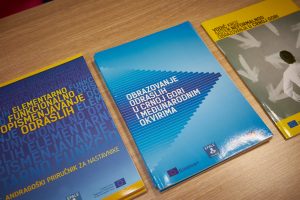PODGORICA, 8 September 2017 – On the occasion of International Literacy Day, the EU Info Centre hosted a panel discussion titled “Literacy – The Basis for Lifelong Education and Learning”, organised by the national Centre for Vocational Education. The director of the centre, Dusko Rajkovic, said in his introductory address that “the notion of literacy is becoming wider” and that it is necessary to keep up with the requirements of today.
 “Today we mark International Literacy Day, 8 September, which was established by UNESCO in 1967. However, the times are changing. Literacy back in 1967 was not the same as literacy today. Key competences are expanding and literacy needs are increasing. It is not enough anymore to only speak one’s mother tongue and use the alphabet of that language. Today, you need to know at least one other world language so that you can be competitive and that you can say that you are literate,” said Rajkovic, adding that mathematical and computer literacy are another prerequisite for functioning in today’s world.
“Today we mark International Literacy Day, 8 September, which was established by UNESCO in 1967. However, the times are changing. Literacy back in 1967 was not the same as literacy today. Key competences are expanding and literacy needs are increasing. It is not enough anymore to only speak one’s mother tongue and use the alphabet of that language. Today, you need to know at least one other world language so that you can be competitive and that you can say that you are literate,” said Rajkovic, adding that mathematical and computer literacy are another prerequisite for functioning in today’s world.
The statistics presented in the discussion show, however, that Montenegro must make further effort to achieve European goals in this area. For example, Monstat’s data collected in the 2011 census shows that only half of the population older than 15 knows how to use a computer, about a quarter of the population knows English, almost one in 10 adult citizens know Russian, and only 5% of citizens know Italian as the third most common foreign language.
Another worrying fact is that as many as 28% of adult citizens of Montenegro only have primary-level or incomplete primary education, while this number in the countries of the European Union stands at about 6.5% of adults.
 Gordana Boskovic, the Adult Education Adviser at the Centre for Vocational Education, pointed out that the European Union has a goal to make sure that, by the year 2020, the percentage of people aged 25 to 64 who are taking part in education or training programmes reaches 15% from the EU average of 10.8% recorded in 2016. In Montenegro, this figure is currently 2.4%.
Gordana Boskovic, the Adult Education Adviser at the Centre for Vocational Education, pointed out that the European Union has a goal to make sure that, by the year 2020, the percentage of people aged 25 to 64 who are taking part in education or training programmes reaches 15% from the EU average of 10.8% recorded in 2016. In Montenegro, this figure is currently 2.4%.
The panel discussion on the activities for improving the literacy of citizens which followed included representatives of the Employment Agency of Montenegro, the national-level Human Resources Management Authority, the Chamber of Commerce and the Multidisciplinary Educational Centre ‘Pamark’.
 In its efforts to improve literacy levels in the country, the Centre for Vocational Education also enjoys EU support through two ongoing projects: the “EPALE National Support Service for Montenegro” and the “National Coordinator for the Implementation of the European Agenda for Adult Learning”, through which, among other things, they are looking to strengthen and link teaching capacities and inform and encourage potential users of some of the more than 100 existing adult education programmes.
In its efforts to improve literacy levels in the country, the Centre for Vocational Education also enjoys EU support through two ongoing projects: the “EPALE National Support Service for Montenegro” and the “National Coordinator for the Implementation of the European Agenda for Adult Learning”, through which, among other things, they are looking to strengthen and link teaching capacities and inform and encourage potential users of some of the more than 100 existing adult education programmes.
